Cite this document
(Computer Crimes and Digital Investigations Essay, n.d.)
Computer Crimes and Digital Investigations Essay. Retrieved from https://studentshare.org/law/1729606-cybercrime
Computer Crimes and Digital Investigations Essay. Retrieved from https://studentshare.org/law/1729606-cybercrime
(Computer Crimes and Digital Investigations Essay)
Computer Crimes and Digital Investigations Essay. https://studentshare.org/law/1729606-cybercrime.
Computer Crimes and Digital Investigations Essay. https://studentshare.org/law/1729606-cybercrime.
“Computer Crimes and Digital Investigations Essay”, n.d. https://studentshare.org/law/1729606-cybercrime.


